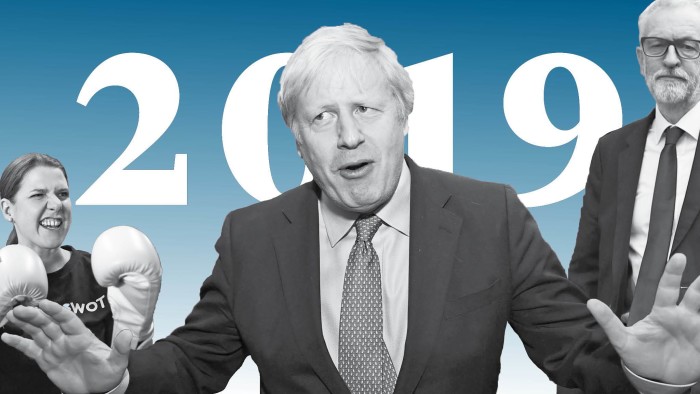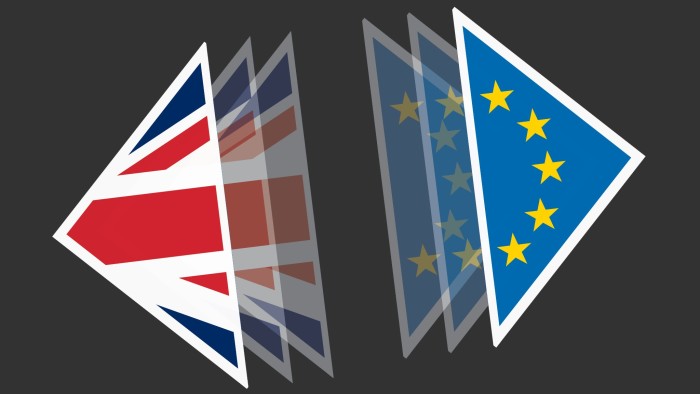The year Britain finally broke the Brexit deadlock

Roula Khalaf, Editor of the FT, selects her favourite stories in this weekly newsletter.
2019 will be remembered as the year in which the political deadlock at Westminster over Brexit was finally resolved.
Remainers argue that the process of taking the UK out of the EU is far from complete because the two sides have to thrash out a new long-term relationship based around a free trade agreement.
But after a tumultuous year in which the British parliament repeatedly refused to approve a withdrawal agreement negotiated by Theresa May, the December 12 general election put an end to the impasse at Westminster when Boris Johnson’s Conservatives won a resounding victory to implement Brexit by January 31.
“Leaving the EU is the biggest decision this country has taken since the second world war,” said Vernon Bogdanor, the leading political historian. “But it wasn’t clear until the general election a few weeks ago that Britain would definitely leave the EU. Only now, with Boris Johnson’s election win, is it clear that Brexit will happen and that the hopes for Remain are finally dead.”
British politics has been ugly since the EU referendum in 2016, but the level of confrontation between Leavers and Remainers ratcheted up several notches over the past year, and at times it felt like the country was descending into chaos.
Mrs May tried and failed three times to persuade MPs to vote for her Brexit deal, principally because the Conservatives had no majority in the House of Commons.
Mr Johnson, the leading Eurosceptic Tory who succeeded Mrs May as prime minister in July, quickly provoked outrage when he announced plans to suspend parliament.
He appeared to want to stop the Commons from outlawing a no-deal Brexit, which he was threatening to proceed with, but MPs including Europhile Conservatives rushed to approve legislation that sought to prevent the UK leaving the EU without an agreement.
The Supreme Court then delivered a searing rebuff to Mr Johnson in September by ruling that his advice to the Queen to prorogue parliament was unlawful.
“The level of anger and bitterness has been awful to behold and nearly everybody has behaved badly,” said Anand Menon, director of The UK in a Changing Europe, a think-tank.
Two key factors explain why Mr Johnson looks set to succeed with implementing Brexit, in stark contrast to Mrs May.
First, he won over Eurosceptic Conservative MPs who steadfastly rejected Mrs May’s withdrawal agreement by forging a new deal with the EU that nevertheless involved major compromises.
He got rid of arrangements in her agreement to avoid a hard border on the island of Ireland, which Eurosceptics hated because a so-called backstop potentially locked the UK into a customs union with the EU in perpetuity.
But Mr Johnson’s deal puts strain on the UK by placing a customs and regulatory border between mainland Britain and Northern Ireland after Brexit.
The Democratic Unionist party, which opposed Mrs May’s withdrawal agreement for treating Northern Ireland differently to the rest of the UK, also objected to Mr Johnson’s deal.
The prime minister “was determined to get his deal implemented, even if that meant sacrificing the union”, said Mujtaba Rahman, a managing director at the Eurasia Group, a consultancy.
Second, opposition parties failed to maintain their unity after successfully combining to try to outlaw a no-deal Brexit.
They successfully opposed Mr Johnson’s demands for a snap election to break the Brexit deadlock because of the risk of the UK leaving the EU without an agreement on October 31.
But once this was averted, the so-called rebel alliance of opposition parties and Europhile Tories — where MPs had to varying degrees supported a new Brexit referendum — fell apart.
Jo Swinson’s Liberal Democrats and Nicola Sturgeon’s Scottish National party decided to back a poll. Jeremy Corbyn’s Labour party subsequently also supported an election.
“The wisest strategy for those advocating a second referendum would have been to deny Mr Johnson an election and to keep him twisting in the wind as he tried to get his Brexit deal through the Commons,” said Tom Baldwin, former head of communications at the People’s Vote, the organisation that campaigned for a second Brexit referendum.
“His deal would have unravelled in the Commons as its flaws became clearer. That would have paved the way for a confirmatory referendum as the only solution to the impasse. But it was not to be.”
Mr Johnson’s election victory on December 12 based on his pledge to “Get Brexit done” was the Conservatives’ best performance since the party was led by Margaret Thatcher, but the poll was significant in several different ways.
Brexit Election Briefing

Help us steer you through the twists and turns of Britain’s political turmoil, from Monday to Friday.
It marked the moment when the Tories secured a swath of constituencies in northern England, the Midlands and Wales that had been long held by Labour and which mainly backed Leave in the 2016 referendum.
Voters in these seats rejected the hard left economic plans put forward by Mr Corbyn, who was also hurt by his equivocation on Brexit and allegations that he failed to root out anti-Semitism in his party.
The Tories’ success was also aided by Nigel Farage’s Brexit party, which decided not to fight any of the 317 seats won by the Conservatives at the 2017 election.
But while Mr Johnson emerged with an 80-seat majority in the Commons, the election also highlighted the potential fragility of the UK because nationalist parties in Scotland and Northern Ireland returned a majority of the MPs from their respective nations.
“British politics is coming to be dominated less by economic divisions like class and more by questions of identity,” said Professor Bogdanor.
“In Britain, the key question is less and less ‘What ought to be the role of state?’ and more ‘What does it mean to be British?’ In particular, the question is whether being British is compatible with being European and whether being British is compatible with being Scottish.”
Failing to seize the centre ground
The year started amid high hopes that a new party would break the mould and seize the centre ground of British politics.
The anti-Brexit Independent Group was founded in February by former Labour and Conservative MPs who were deeply disillusioned with their old parties.
Seven Labour MPs led by Chuka Umunna and Luciana Berger rejected the Euroscepticism and hard left policies of party leader Jeremy Corbyn.
Within days three Europhile Tories, including Anna Soubry, had joined forces with the former Labour MPs.
But the group — which renamed itself Change UK — failed to make an impact in the European Parliament elections in May after deciding to go head to head with other anti-Brexit parties.
Some of the group’s MPs, including Mr Umunna and Ms Berger, later defected to the Liberal Democrats.
After the December 12 general election, Ms Soubry announced plans to disband what was left of the group after it failed to win any seats at Westminster.
Comments